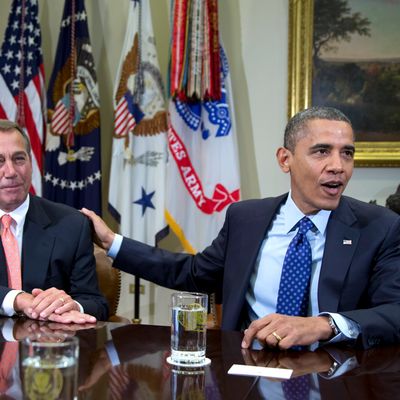
For about half a day, in the wake of President Obama’s most recent budget compromise, it appeared that an agreement might be close at hand. Boehner was reported to be taking the temperature of his crazies on Obama’s plan. But then Drudge began freaking out (Headline: “SPEAKER SUICIDE: MORE TAXES, MORE DEBT”), and soon it emerged that Boehner was actually talking up a “Plan B,” about which more below. What will probably become apparent, perhaps after House Republicans vote down Obama’s final deal, is that the notion of a grand bargain between Obama and Boehner to avert the “fiscal cliff” was always going to be the hardest way to solve this problem.
The most interesting development of the last 24 hours is that Boehner has begun to define his position in new, concrete terms: a dollar of spending cuts for every dollar of revenue. The two parties are arguing over whether Obama’s offer qualifies. By Obama’s definition, it does easily. Obama is counting the spending cuts agreed to in the summer of 2011, which also established the budget sequester, as the first part of the bargain. He’s also counting the decreased amount of money that will be spent on interest — a budget accounting method Republicans have used repeatedly but now deride because it increases their leverage to do so. Boehner refuses to count either one, and so by Boehner’s math, Obama falls short of the one-to-one standard.
Boehner’s “Plan B” is an updated version of the short-lived Republican “Doomsday Plan.” The Doomsday Plan was to extend all of the Bush tax cuts for income under $250,000 a year and then promise a big fight later. Plan B is to try to peel apart Democrats in the Senate by passing a bigger tax cut, reaching higher up the income range — up to $1,000,000 a year. The idea would be to put either Obama or Senate Democrats in a difficult spot. Some Democrats have previously suggested extending the Bush tax cuts for incomes up to a million dollars a year or some other threshold higher than Obama’s. The play here would be to split the Democrats up. Ideally, Senate Democrats would cave in, pass the House bill, and then Obama would be standing in the way of tax cuts for the middle class.
In fact, this would be a pretty easy tactic for Obama to block. Polls show strong support for his position — 69 percent told Politico they favor raising taxes on incomes over $250,000 a year. Strong majorities also approve of Obama’s handling of the fiscal cliff and disapprove of the Republicans’. Easy as it may be to insist politicians will win a fight if they stand firm for your position, in this case it’s true: Obama is not going to lose this fight if he stands firm.
What all this shows, again, is how much easier a deal gets in January. Once the Bush tax cuts for the rich have expired, then Obama doesn’t need to bargain for the revenue, and Republicans don’t need to vote to “give” it to him. All Obama needs at that point is another couple hundred billion dollars in revenue, against which he is offering some $800 billion in cuts.
Since the revenue from the expiration of the Bush tax cuts for the rich will be already baked into the cake, Boehner can than persuade his caucus to vote for a tiny amount of new revenue, none requiring higher rates and perhaps even throwing in lower rates as an inducement, in return for real spending cuts. A 4:1 ratio of spending cuts to tax hikes, by Boehner’s own method of counting! An unbeatable deal.
In theory, this ought to be unnecessary. Everybody knows what happens in January. Both sides ought to be able to anticipate it and make the deal they could make then now. Business types have therefore assumed a December deal would happen. If this was a business deal between two rational people, that’s what would happen.
But we are not dealing with rational people here. We are dealing with House Republicans. As Republican Tom Cole gently put it, by way of describing his colleagues’ implacable hatred of taxes, “It’s who they are. It’s the air they breathe. It’s what the Republican electorate produces.”
If Boehner strikes a deal before January, Republicans will suspect he gave away revenue he could have fought for. But if he refuses, the House Republicans will see for themselves what happens. The revenue will go away on its own, over Boehner’s objections. All Obama has to do is continue to make clear he will not under any circumstances extend any tax cuts on income over $250,000 a year. Then he has nearly all the revenue he needs, and he can offer Republicans a deal they would never walk away from. They might try to get that deal in December, but January remains the best bet.






























